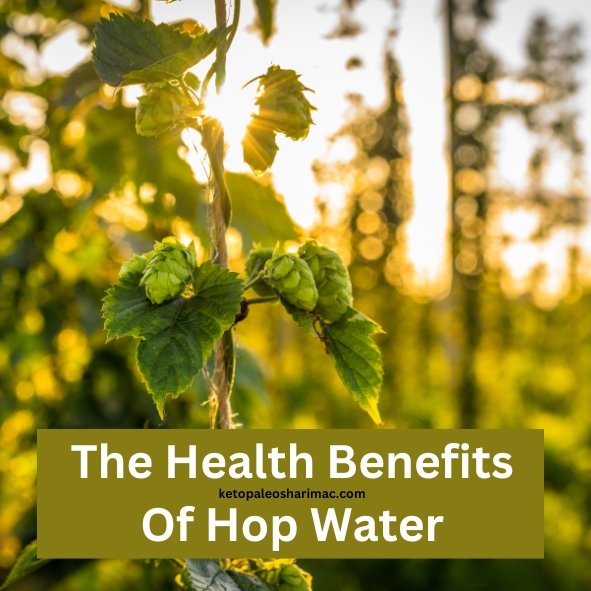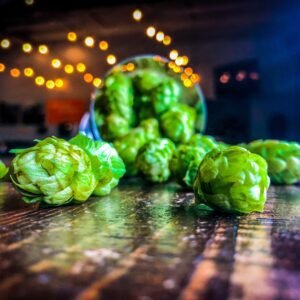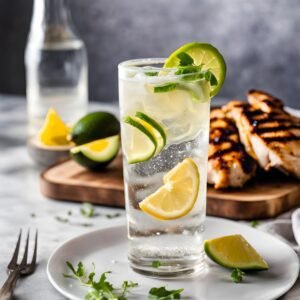Hop Water; The Health Benefits

Hop Water was a delightful discovery during my recent visit to Boston with my husband Shawn, where we attended an NBA playoff game and quickly fell in love with the city. While exploring, we stopped by Whole Foods to stock up on snacks and drinks for our hotel room. It was there that I first encountered this beverage. Intrigued by its nutritional label—only a few calories and zero carbs—I decided to buy a six-pack. As someone who used to enjoy the taste of beer but avoided it due to its calorie content and bloating effects, I was excited to try something new. After four years of abstaining from alcohol, I had already found joy in non-alcoholic beers, but this refreshing sparkling water with hop flavor provided a completely fresh experience.
Once back at the hotel, Shawn and I tried Hop Water for the first time and were instantly hooked. Throughout the week, we experimented with several different brands and quickly identified our favorites. If you’re following a keto or low-carb diet, you might be on the lookout for new, healthy beverages to add to your collection. Recently, this refreshing non alcoholic beverage has been gaining popularity, but what is it really, and does it live up to the health claims?
In this guide, we will explore the science behind Hop Water, examine its potential health benefits, and clarify any misconceptions. Whether you’re committed to a keto lifestyle or simply seeking to cut down on sugar intake, you’ll gain valuable insights into whether Hop Water deserves a place in your beverage lineup.
What Is Hop Water?

Here are some key points:
Key Characteristics:
- Zero alcohol: Unlike beer, this zero alcoholic hop seltzer contains no alcohol, making it a suitable alternative for those avoiding alcoholic beverages.
- Mostly Calorie-free: With no carbohydrates or calories, hop sparkling water is a guilt-free option for those watching their intake.
- Crisp and carbonated: Most hop waters are lightly carbonated, providing a refreshing fizz.
- Subtle hop flavor: The infusion process imparts a mild hoppy taste without overwhelming bitterness.
Production Process:
The creation of non alcoholic hoppy water typically involves steeping hops in hot water for about 20 minutes and then filtering out the hop material to leave a clear liquid. Most brands also carbonate the resulting infusion. Some commercial varieties may add natural sweeteners like monk fruit or stevia to balance the hop bitterness, though this isn’t universal.
Appeal and Benefits:
Hop water has gained popularity for several reasons:
- Craft beer alternative: It offers the complex flavors associated with craft IPAs without the alcohol.
- Hydration: As a water-based beverage, it helps maintain hydration.
- Potential health benefits: Hops contain compounds that may have calming effects, though more research is needed to confirm these benefits in hop sparkling water.
What Are The Potential Health Benefits of Hop Water?

Here’s an improved overview of the potential health benefits of hop water:
Antioxidant Powerhouse:
Also known as hop seltzer, this non alcoholic drink is rich in polyphenols, particularly flavonoids, which are potent antioxidants. These compounds have been shown to possess significant free radical scavenging abilities, often surpassing the antioxidant capacity of vitamin E analogues.
The main hop polyphenols include:
These antioxidants can help protect cells from oxidative stress, potentially reducing the risk of chronic diseases and supporting overall health.
Anti-Inflammatory Properties:
Hop extracts have demonstrated impressive anti-inflammatory effects in various studies.
They can modulate the immune response by:
- Decreasing pro-inflammatory cytokines (IL-1β, IL-6, TNF-α)
- Reducing monocyte chemo-attractant protein (MCP-1)
- Lowering nitric oxide production
These anti-inflammatory properties may contribute to improved overall health and potentially reduce the risk of inflammatory-related conditions.
Carb-Free, Low-Calorie Alternative:
For those following low-carb or ketogenic diets, hop wtr serves as an excellent beverage choice. It typically contains virtually no carbohydrates or calories, making it a refreshing alternative to sugary drinks or alcoholic beverages.
Potential Gut Health Support:
Some research suggests that hop compounds, particularly alpha acids, may have prebiotic effects. These compounds could potentially support a healthy gut microbiome by promoting the growth of beneficial bacteria.
Sleep and Relaxation Aid:
Hops have traditionally been used for their mild sedative properties. Compounds like myrcene and linalool found in hops may contribute to improved sleep quality and relaxation. While more research is needed specifically on hop water, these properties suggest potential benefits for sleep and stress reduction
Hydration with Added Benefits:
Zero alcoholic hop wtr provides hydration similar to regular water but with the added benefits of hop-derived compounds. It can be an excellent alternative to sugary beverages, helping maintain proper hydration while delivering potentially beneficial plant compounds.
Considerations and Future Research:
While the potential health benefits of hop water are promising, it’s important to note that much of the current research focuses on hop extracts rather than zero alcoholic hop seltzer specifically. More studies are needed to fully elucidate the effects of hop water consumption on human health.Additionally, the bioavailability and concentration of beneficial compounds in hop water may vary depending on the production method and hop varieties used. Future research should aim to standardize hop water formulations and investigate their long-term effects on health outcomes.
In conclusion, hop sparkling water offers a unique combination of potential health benefits, making it an intriguing option for those seeking a refreshing, non-alcoholic beverage with added nutritional value. As research progresses, we may gain a clearer understanding of how hop water can contribute to overall health and wellness.
Is Hop Water All It’s Cracked Up to Be?

With all the hype surrounding hop water, it’s natural to be skeptical. After all, how much of the reported health benefits can really be attributed to this drink?
Let’s take a closer look at some of the claims and see how they hold up:
Claim: Hop Water is a Potent Source of Antioxidants This one is largely true. Hops are indeed packed with polyphenol antioxidants, including compounds like xanthohumol and isoxanthohumol. These antioxidants have been shown to have anti-inflammatory, neuroprotective, and even anti-cancer properties in various studies.
However, it’s important to note that the concentration of these beneficial compounds in hop water may not be as high as in some other hop products, like hop extracts or powders. The brewing and filtration process used to make hop water can potentially degrade or remove some of the more delicate antioxidants.
Claim: Hop Water Supports Gut Health The research on the gut-friendly effects of hops is still fairly limited and mixed. While the bitter alpha acids in hops do seem to have some prebiotic-like properties, it’s unclear if the concentrations found in hop water are high enough to make a significant impact on gut bacteria.
That said, the carbonation in hop water could potentially have a positive effect on digestion and gut motility, even if the hops themselves don’t provide a major prebiotic boost. More research is needed to fully understand the gut health implications of this beverage.
Claim: Hop Water Promotes Better Sleep This is another area where the evidence is a bit shaky. While hops have long been used in traditional medicine for their sedative and sleep-promoting effects, the research on hop water specifically is scarce.
Some studies have found that hop supplements may modestly improve sleep quality, but it’s unclear if the relatively low concentrations of active compounds in hop water would have the same effect. The relaxing, ritualizing experience of sipping on a calming beverage before bed may provide more of a sleep benefit than the hops themselves.
So, is hop water worth the hype? The short answer is: it depends. For keto and low-carb dieters, it can certainly be a refreshing, guilt-free alternative to sugary drinks. And the antioxidant content may provide some general health benefits.
But in terms of the more specific claims around gut health, sleep, and other targeted benefits, the jury is still out. Hop water may provide a modest boost in these areas, but it’s unlikely to be a miracle cure-all. As always, it’s important to manage your expectations and not get swept up in the hype.
How to Incorporate Hop Water Into a Keto or Low-Carb Diet
If you’re convinced that this zero alcohol spritzer deserves a spot in your low-carb lifestyle, here are a few tips for making the most of it:
- Use it as a Replacement for Soda or Juice Swap out your usual sugary beverages with hop water to cut down on carbs and calories. It provides a similar bubbly, refreshing experience without the blood sugar spike.
- Pair it with Meals Hop water can be a great accompaniment to low-carb meals, helping to cleanse the palate and aid digestion. Try sipping on it during or after your keto-friendly dishes.
- Experiment with Flavor Combinations Many hoppy water brands offer a variety of flavors, from citrus to berry to herbal. Experiment to find the combinations that you enjoy most. You can also try adding a splash of lemon or lime juice for an extra flavor boost.
- Hydrate with it Throughout the Day Treat hop water like you would any other water – keep a bottle or can on hand and sip on it regularly to stay hydrated. The carbonation and subtle flavor can make it a more appealing option than plain H2O.
- Use it in Mocktails For a fun, low-carb twist on happy hour, try using this hop seltzer as a mixer in booze-free mocktails. The hop flavor pairs nicely with non alcoholic spirits like gin or vodka.
Remember, while hop water can be a great addition to a keto or low-carb diet, it shouldn’t be viewed as a cure-all or a replacement for a balanced, nutrient-dense eating plan. It’s still important to focus on whole, unprocessed foods and to stay hydrated with plenty of regular water as well.
But if you’re looking for a refreshing, flavorful beverage that won’t sabotage your low-carb progress, hop water is definitely worth a try. Just be sure to separate the facts from the fiction and enjoy it in moderation as part of a healthy lifestyle.
How Is Hop Water Made?

The manufacturing process for hop water can vary slightly between brands, but generally it follows a similar set of steps:
- Hop Selection: The first crucial step is choosing the right hops. Brewers and hop water producers typically favor more aromatic, less bitter hop varietals like Cascade, Citra, or Mosaic. These hops provide a bright, citrusy, or piney flavor profile without an overpowering bitterness.
- Steeping: The hops are added to hot, filtered water and allowed to steep for a period of time, usually between 30-60 minutes. This extraction process helps transfer the essential oils, resins, and other beneficial compounds from the hops into the water.
- Filtration: After steeping, the hop plant matter is removed through a filtration process, leaving behind the clear, hop-infused liquid. This helps create a crisp, clean flavor profile without any grassy or vegetal notes.
- Carbonation: Most hop water brands then carbonate the filtered liquid to add a refreshing effervescence. This can be done through a forced carbonation process or by allowing the water to naturally carbonate.
- Sweetening (optional): Depending on the brand, a small amount of natural sweetener like monk fruit or stevia may be added to balance out the bitterness of the hops.
- Packaging: The final hop water is then packaged, typically in cans or bottles, to preserve the carbonation and flavor.
The end result is a low-calorie, low-carb beverage with a distinctive hoppy taste and aroma. While the specifics may vary, this general process is how most mainstream hop bubby products are made.
What Is The Truth About Antioxidants in Hop Water?

It’s true that hops are a rich source of polyphenol antioxidants, including compounds like xanthohumol and isoxanthohumol. These antioxidants have been shown to have a variety of beneficial effects, from reducing inflammation to potentially fighting cancer.
However, the concentration of these antioxidants in this zero alcoholic hop seltzer may not be as high as in some other hop-derived products, like hop extracts or powders. The brewing and filtration process used to make hop water can potentially degrade or remove some of the more delicate antioxidant compounds.
That said, hop water still likely provides a decent dose of these beneficial plant compounds, especially compared to many other low-calorie beverages. But the overall antioxidant potency may not be as robust as some marketing claims would suggest.
Examining the Gut Health Claims
The research on the gut-friendly effects of hops is still fairly limited and mixed. While the bitter alpha acids in hops do seem to have some prebiotic-like properties, it’s unclear if the concentrations found in hop water are high enough to make a significant impact on gut bacteria.
Some studies have found that hop compounds may selectively promote the growth of beneficial gut microbes, but the evidence is still preliminary. The carbonation in hoppy water could potentially have a positive effect on digestion and gut motility as well, even if the hops themselves don’t provide a major prebiotic boost.
More research is needed to fully understand the gut health implications of this beverage. For now, the claims around hop water’s ability to support the microbiome should be viewed with cautious optimism.
Can Hop Water Really Improve Sleep?
This is another area where the evidence is a bit shaky when it comes to hop water specifically. While hops have long been used in traditional medicine for their sedative and sleep-promoting effects, the research on this healthy bubbly as a sleep aid is scarce.
Some studies have found that hop supplements may modestly improve sleep quality, but it’s unclear if the relatively low concentrations of active compounds in hop water would have the same effect. The relaxing, ritualizing experience of sipping on a calming beverage before bed may provide more of a sleep benefit than the hops themselves.
Overall, while hop water may provide a slight boost in this area, it’s unlikely to be a miracle cure for insomnia or sleep issues. The sleep-promoting claims should be taken with a grain of salt until more research is done on this specific product.
So, is hop seltzer really as healthy as it seems? The answer is a bit complicated. While it does have some promising attributes, like its low-carb profile and antioxidant content, the research on many of the specific health claims is still quite limited.
Ultimately, hop water should be viewed as a potentially beneficial, low-calorie beverage option – especially for those following keto or low-carb diets – but not as a cure-all or a replacement for a balanced, nutrient-dense lifestyle. As with any food or drink, it’s important to manage your expectations and not get swept up in the hype.
How to Enjoy Hop Water on a Keto or Low-Carb Diet?

Here’s how to make the most of your hop sparklers while following a low-carb lifestyle:
Beverage Replacement:
Hop water serves as an ideal substitute for higher-carb drinks:
- Swap for beer: Use hop water to satisfy cravings for the hoppy taste of IPA without the carbs and alcohol
- Replace sodas and juices: Opt for hop water instead of sugary beverages to reduce carb intake while still enjoying a flavorful drink.
Meal Pairing:
Incorporate hop water into your dining experience:
- Complement keto meals: The carbonation and subtle bitterness can enhance the flavors of your low-carb dishes.
- Aid digestion: The fizzy nature of hop water may help cleanse the palate and support digestive processes.
Flavor Exploration:
Experiment with different hop water varieties:
- Try various brands: Lagunitas Hop Water and HOP WTR are popular options with distinct flavor profiles
- Explore flavor combinations: Some hop waters include adaptogens and nootropics for added benefits
Hydration Strategy:
Use hop water to maintain hydration throughout the day:
- Alternative to plain water: The subtle hop flavor can make staying hydrated more enjoyable.
- Electrolyte balance: Some hop waters may contain trace minerals that support hydration.
Mixology:
Get creative with hop water in your drink recipes:
- Low-carb cocktails: Use hop water as a mixer with keto-friendly spirits like vodka or gin.
- Mocktails: Create alcohol-free drinks using hop water as a base for a beer-like experience.
Nutritional Considerations
Keep these factors in mind when incorporating hop water:
- Zero calories and carbs: Most hop waters are calorie-free and contain no carbohydrates, making them ideal for keto diets
- Added benefits: Some brands include ingredients like ashwagandha and L-Theanine, which may offer stress-reducing and mood-boosting effects
By integrating hop water into your keto or low-carb lifestyle, you can enjoy a flavorful, refreshing beverage without compromising your dietary goals. Remember to read labels carefully and choose options that align with your specific nutritional needs.
What Is The Bottom Line On This Hop Flavored Sparkling Water?

Hop water is a unique, low-calorie beverage that has been generating a lot of buzz in the health and wellness world, especially among keto and low-carb dieters. With its distinctive hoppy flavor, lack of carbs and calories, and potential health benefits, it’s easy to see why this trendy drink has captured the attention of so many.
However, it’s important to separate the facts from the fiction when it comes to the purported benefits of hop seltzer. While it does appear to be a decent source of antioxidants and may have some gut-friendly and sleep-promoting properties, the research on these specific claims is still quite limited.
Ultimately, this refreshing bubbly should be viewed as a potentially beneficial, low-carb beverage option – one that can be a refreshing alternative to sugary sodas and juices. But it shouldn’t be viewed as a miracle cure-all or a replacement for a balanced, nutrient-dense lifestyle.
If you’re interested in incorporating hop water into your keto or low-carb routine, focus on using it as a hydrating, flavorful replacement for high-carb drinks. Experiment with different brands and flavor combinations to find what you enjoy most. And as always, be sure to maintain a healthy, sustainable approach to your overall diet and lifestyle.
With a bit of discernment and moderation, hop seltzer can be a tasty, low-carb addition to your beverage repertoire. Just don’t get too carried away by the hype – approach it with realistic expectations, and enjoy it as part of a well-rounded healthy lifestyle.
What Other Non Alcoholic Beverage Blogs Might You Enjoy?

Here are a few I thought you may enjoy:
- Secrets To Pairing Alcohol-Free White Wines with Seafood Delights
- How To Choose The Best Zero Alcohol Red Wine
- ONES Sparkling Rose & Lemon-Ginger Cod
- 16 Jaw-Dropping Non Alcoholic Wine Health Benefits
- Non Alcoholic Wine Explained For Low-Carb Sippers
- How To Master Non-Alcoholic Wine Etiquette At Social Events
- How To Choose The Best Zero Alcohol Red Wine
- Cracking The Code Of Pairing Non Alcoholic Wines With Cheese
I’m excited to share with you my good news… Introducing Sinless Sourdough – Where Ancient Art Meets Low Carb Science!

Stop sacrificing flavor for your health goals – our authentic heritage sourdough starters have been specially adapted for low-carb baking
Limited Time Offer: 82% OFF – Only $19.99 Today (Regular Price: $113)
Sinless Sourdough™ Starter + Membership Includes:
- Authentic Heritage Starter shipped directly to your door
- Complete Video Training Library showing you step-by-step how to create:
- Artisan boules and batards with delicious crispy crust and soft interior
- Crisp French baguettes for the dinner table or as crostini
- Chewy Montreal-style bagels that won’t spike your blood sugar
- German street pretzels with authentic alkaline crust
- Convenient everyday bread machine loaves for sandwiches
- Supportive Community of fellow low-carb bakers to share your journey
- Extensive Recipe Collection for using sourdough discard (nothing goes to waste!)
“After years of disappointing low-carb bread experiments, Sinless Sourdough changed everything. I’m enjoying real sourdough again without the carb guilt!” — Maria T.
“My family can’t tell the difference between these loaves and traditional bread. The starter is incredibly active and the results are amazing!” — James K.
🔥 CLAIM YOUR MEMBERSHIP NOW 🔥
Use code: Sinless82 at checkout Offer expires soon! Limited starter batches available
82% OFF TODAY FOR MEMBERSHIP
Sinless Sourdough™ Heritage Collection

Transform your low-carb baking with our Global Heritage Collection featuring unique starters from historic moments across continents. Each brings its own personality and flavor profile while maintaining excellent nutritional values—just 1g net carbs compared to 8-10g in traditional starters.
Choose from:
- 1849 San Francisco Gold Rush – Authentic California sourdough character
- 1898 Yukon Gold Rush – Subtle tanginess with notes of butter
- 1847 Oregon Trail – Rustic character with exceptional rise
- 1000-Year-Old Italian Monastery – Delicate complexity with ancient lineage
Each starter connects you to centuries of baking tradition while supporting your modern low-carb lifestyle. Our proprietary transformation process preserves their unique characteristics while adapting them for health-conscious baking.
When you purchase any Sinless Sourdough™ starter, you receive our comprehensive onboarding sequence teaching you exactly how to revive your dehydrated starter for perfect low-carb, high-protein results every time.
Click the link:
SINLESS STARTER SHOP
🍞 START YOUR LOW-CARB SOURDOUGH JOURNEY TODAY! 🍞
Medical Studies and Reviews on Sourdough
Here they are:
Does Sourdough Bread Provide Clinically Relevant Health Benefits?
The Sourdough Microbiome
Study Of Sourdough Starter Microbiome To Boost Bread Quality and Safety
Sourdough Microbiome Comparison and Benefits
Effect of Breadmaking Process on In Vitro Gut Microbiota Parameters in Irritable Bowel Syndrome
Nutritional Benefits of Sourdough; Systematic Review
Sourdough-leavened bread improves postprandial glucose and insulin plasma levels in subjects with impaired glucose tolerance
Use of sourdough in low FODMAP baking
A novel formulation of sourdough bread enriched with plant sterols and high-fibre inulin improves metabolic control in type 2 diabetes
Impact of sourdough fermentation on appetite and postprandial metabolic responses – a randomised cross-over trial with whole grain rye crispbread
Disclaimer:
All information provided on this website regarding the health benefits of sourdough low carb bread is intended for educational purposes only. The content presented is not meant to be taken as specific medical advice for any individual. It should not be considered a replacement for professional medical guidance or treatment. If you have any health concerns, especially related to diabetes, pre-diabetes, or any other medical condition, please consult with a healthcare professional immediately.
- UNUSUAL KETO INSTANT POT RECIPES FOR 2025 - April 27, 2025
- Boost Your Keto Diet with These Non-Alcoholic Wine Hacks - April 27, 2025
- 10 Unique & Healthy Mocktails You Need to Try - April 27, 2025


